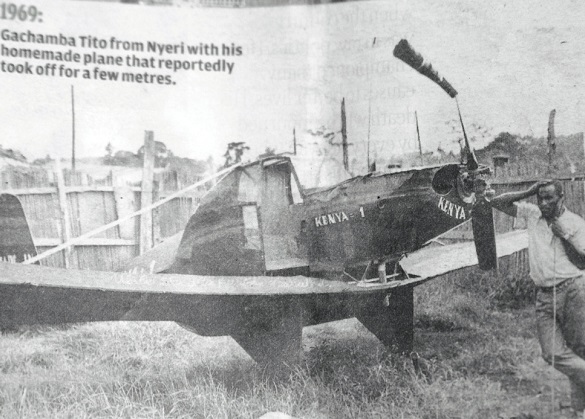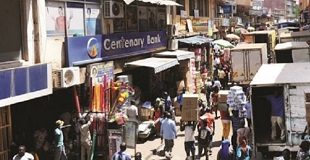
INDEPENDENCE SPECIAL: By Ngugi wa Thiong’o
In 1969 Gacamba, a bicycle repairer in Nyeri, a town about a hundred miles from Nairobi, discovered some kind of engine, a scooter engine, and, using the scrap metal he could find in his backyard, made an aeroplane that he called Kenya One. The plane flew for a few miles or so, but on landing it crashed into some trees. Charles Njonjo, then the attorney general of the recently independent Republic of Kenya, barred Gacamba from ever flying his plane without an aviation license: his primitive plane obviously did not meet the standards set by those of the planes made in Europe.
I am less interested in the fact that Njonjo stopped Gacamba from flying than in the symbolism of the two men, in their attitudes toward their native land. Gacamba probably had not gone beyond secondary school, but Njonjo had graduated from Fort Hare University in South Africa and Lincoln’s Inn, London, which made him a British barrister, and one of the most highly educated Kenyans of his time.
Njonjo knew the English language so well that he could even speak it through the nose, as we used to say of the European settlers. Gacamba on the other hand was not as fluent in English, but he was probably more fluent in Gĩkũyũ. The point is this: while Gacamba, the Gĩkũyũ-speaking metalworker, the Jua Kali or roadside artisan, said that we can make airplanes in Kenya and actually produced one to prove it, the educated, English-speaking attorney said we could not. Gacamba wanted to dream his dream; Njonjo gloried in the dreams dreamt by others. Gacamba wanted to rescue the possible from the impossible. The educated Kenyan with a perfect British accent said, “Don’t you even try.”
African languages were our beginning, said Kamirithu. English is our beginning, said those who imprisoned me
Here were two conflicting visions of Kenya: Gacamba’s vision says, Africa can make things. Njonjo’s says, Leave that to Europe. Instead of the capable, traveled Kenyan coming to the aid of a man with raw talent who’d never left Kenya, Njonjo crashed Gacamba’s dream. The result, whether intended or not, was that Gacamba’s invention would no longer function as a model and vision of what could be done within Kenya by ordinary Kenyans.
Gacamba’s venture and the fate it met remind me of another story of the sixties. Again it was 1969. It was not long after I had joined the English Department of the University of Nairobi. English national literature from Spencer to Spender, or Shakespeare to T.S. Eliot, was the core of the syllabus. Why should English national literature serve as the core at a University in Kenya, Owuor Anyumba, Taban lo Liyong, and I asked. We called for the abolition of the English Department.
In reality we were not calling for the abolition of English literature but rather for the reordering of its relationship to our realities: Do we start from There and move to Here—a colonial process, a self-negating process—or move from Here to There—the anti-colonial, the self-affirmative, the progressive process?
We wanted to make Kenya our literary base from which to engage with the world. We aimed to replace the Department of English National Literature with a Department of Literature, centering on Kenyan, East African, African, Caribbean, and Afro-American literatures, and then the literatures of Asia, Latin America, and then Europe, in that order, roughly. The English Department at that time sought to confine literature within the English language; we sought to free literature from the confinement of English and to connect with the rest of the globe. The debate that followed, the great Nairobi debate, would generate, in Africa and elsewhere, what is now known as postcolonial theory.
Our department produced students who have become leading intellectuals in the world: Simon Gikandi, now professor of English at Princeton University; James Ogude, professor at Pretoria, in South Africa; and Gĩtahi Gĩtiti, a professor at the University of Rhode Island, to mention just a few who have made their names abroad. But there are many others within the country: Henry Chakava, Chris Wanjala, Wanjikũ Mũkabi, Kĩmani Njogu. Their national and international visibility is rooted in their base in Kenya.
Why should English national literature serve as the core at a University in Kenya, Owuor Anyumba, Taban lo Liyong, and I asked. We called for the abolition of the English Department.
In 1974 the now famous literature department put forth an approach to the teaching of literature in our schools that would focus first on Kenya, then Africa, then the rest of the world. This would have meant that a child graduating even from a primary school would have knowledge of literary texts from Kenya and their relationship to texts from Asia and Europe. It would have thus produced global literary citizens with their feet firmly rooted in Kenya. But the Moi regime crashed the syllabus by the simple act of cutting the literature curriculum altogether. In the regime’s view, English had to be protected from contamination by a world literature that begins in Kenya; the English linguistic prison had to be guarded by all means necessary, so that the Kenyan cultural prisoners within could not escape into freedom.
Destroying the literature curriculum was not enough to keep the prison guards busy. There was also the Kamĩrĩthũ story. I already have written much about this, so I will be brief. In the Kamĩrĩthũ initiative, intellectuals from the University of Nairobi worked hand in hand with factory and plantation workers, the landless, the jobless, to produce an outstanding performance of Ngaahika Ndeenda (I Will Marry When I Want).
The play was probably the first in postcolonial Kenya to be written in Gĩkũyũ language for the rural dwellers of the village of Kamĩrĩthũ, about forty kilometers from Nairobi. The basic idea behind it was very simple: if you believe that people are the subject and object of development, then you work with them, you work in the language they speak and use. The play was performed to hundreds in the village before it met the same fate as the literature curriculum. On November 11, 1977, Ngaahika Ndeenda was closed, and I, a co-author of the play, was sent to a maximum security prison for a year.
African languages were our beginning, said Kamĩrĩthũ. English is our beginning, said those who imprisoned me.
And with this, we are back to Gacamba’s airplane. In each of these stories, we have the negation of a national initiative in favour of that which comes from outside. That which draws from Kenyan soil is suspect; that which comes from abroad—from Europe, particularly—is uncritically welcome.
 The Independent Uganda: You get the Truth we Pay the Price
The Independent Uganda: You get the Truth we Pay the Price


